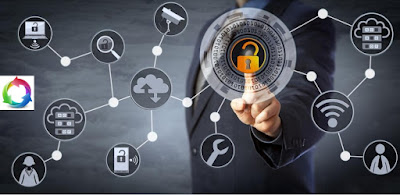What is Cybersecurity
and why it is so important
Over the past few years, there has been a
dramatic increase in the number of hacker attacks, data theft, malicious
programs in the internet, and they are reported not only by the antivirus
developers. In recent months, we have seen that many airlines have
reported data theft, organizations such as FIFA, NHS have been hit by malware. And
even, as reported, the 2016 American elections were compromised - although in
this case, it is most likely a bluff.
As the world is changing rapidly in accordance
with digital transformations, the adoption of robust cybersecurity should be part of this change. Whatever your
business or whatever your role in a foreign company, it is important to
understand what cyber security is
and what is needed to ensure it.
What
is cybersecurity?
“Cybersecurity is
a set of tools, policies, concepts, security guarantees, guidelines, and
approaches to risk management. Providing users with training, advanced
methods, guarantees, technologies that can be used to organize and protect the
cyber environment.”
Cybersecurity
is a major issue that concerns all businesses, regardless of size and all
employees. As per the case for well-being at work and safety rules, the arrival
of the General Regulations on Data Protection (GDPR) in May 2018, invites
leaders to grant more importance to cybersecurity
to protect their data.
In
the era of all connected (machine tools, printers, surveillance cameras,
refrigerators, etc.), we could argue that cybersecurity,
security and safety are one. According to Bruce Schneier, a computer security
guru, "we need to reverse the trend and stop wanting to connect to the
Internet." You have to think twice about the added value of a connected
object in relation to an unconnected object.
Why raise
awareness about cybersecurity at work?
The
consequences of a cyber-attack, cyber malveillance or negligence can have
significant repercussions on the life of the company:
-
many businesses impacted by ransomware no longer have access to their data
-
ESET experts count a resurgence of "fraud to the president" attacks,
a modern version of extortion
-
Data leakage can happen by negligence when an employee forgets their
unencrypted computer on public transit
These
examples of cyberattacks can in some cases force the company to stop its
activity or pay a fine to the Data Protection Authorities (PDAs). Moreover, the
fines will be generalized as of May 2018 during the application of the RGPD.
In
addition to the implementation of IT security measures, the
Directorates-General must also carry out awareness-raising and education
campaigns for employees. Indeed, a study conducted in 2015 by the University of
Alabama in Birmingham shows that 38% of the offenses are internal. 3 out of 4
companies consider employee negligence to be the biggest threat of data
leakage. The study also found that about 75 percent of employees who download
work-related files place them in personal accounts on the cloud.
These
numbers may increase dramatically as companies embrace the cloud and turn to
connected objects. Two recent attacks have also occurred via these channels.
The first is a December 2016 DDoS attack. It has disabled the heating controls
of automated building systems in Finland. The second is a ransomware that
infected the UK's largest hospital (January 2017).
In
order to show the ease with which it is possible to enter an unprotected
system, two white hats in the United States conducted the experiment. They
infiltrated the building management system of an office owned by a technology
giant (Sydney, Australia). In a completely different way, they also proved the
vulnerability of connected St Jude Medical ™ pacemakers. Cybersecurity, health and safety have never been so linked.
Why give as much
credit to cybersecurity as to well-being and enterprise safety?
Over
the years, the introduction of health and safety regulations in the workplace
has improved the well-being of employees (reduction of stress and accidents at
work).
For
the survival of the company, leaders must consider cybersecurity as a priority. Thus, a stronger defense will enhance
the brand's reputation, protect the data and - in some cases as the example of
the connected pacemaker - save lives.
Cybersecurity
must be a top priority for businesses to be properly protected. In an interview
last year with Business Reporter®, Seamus Doyle, CIO at Northern Ireland Water,
stresses the importance of putting cybersecurity,
well-being and security on the same level. "When I talk to some of my
colleagues, [cybersecurity] does not
seem as important to them as welfare and safety at work. This is the next step,
"he says. "Companies have long been sacrificing employee welfare and
safety for productivity. This is not a suitable way of doing business.
Unfortunately, mentalities are moving in the same direction for cybersecurity.
Cybersecurity
in companies aims to reinforce both the security of confidential data relating
to the business activity (ex: manufacturing secrets, human resources ...) and
that of customer data. The goal of the RGPD is to raise awareness of these
concepts to protect privacy and digital heritage.

0 comments:
Post a Comment
Thanks for Comments. Your Comment have been received and approved after the reviewing.